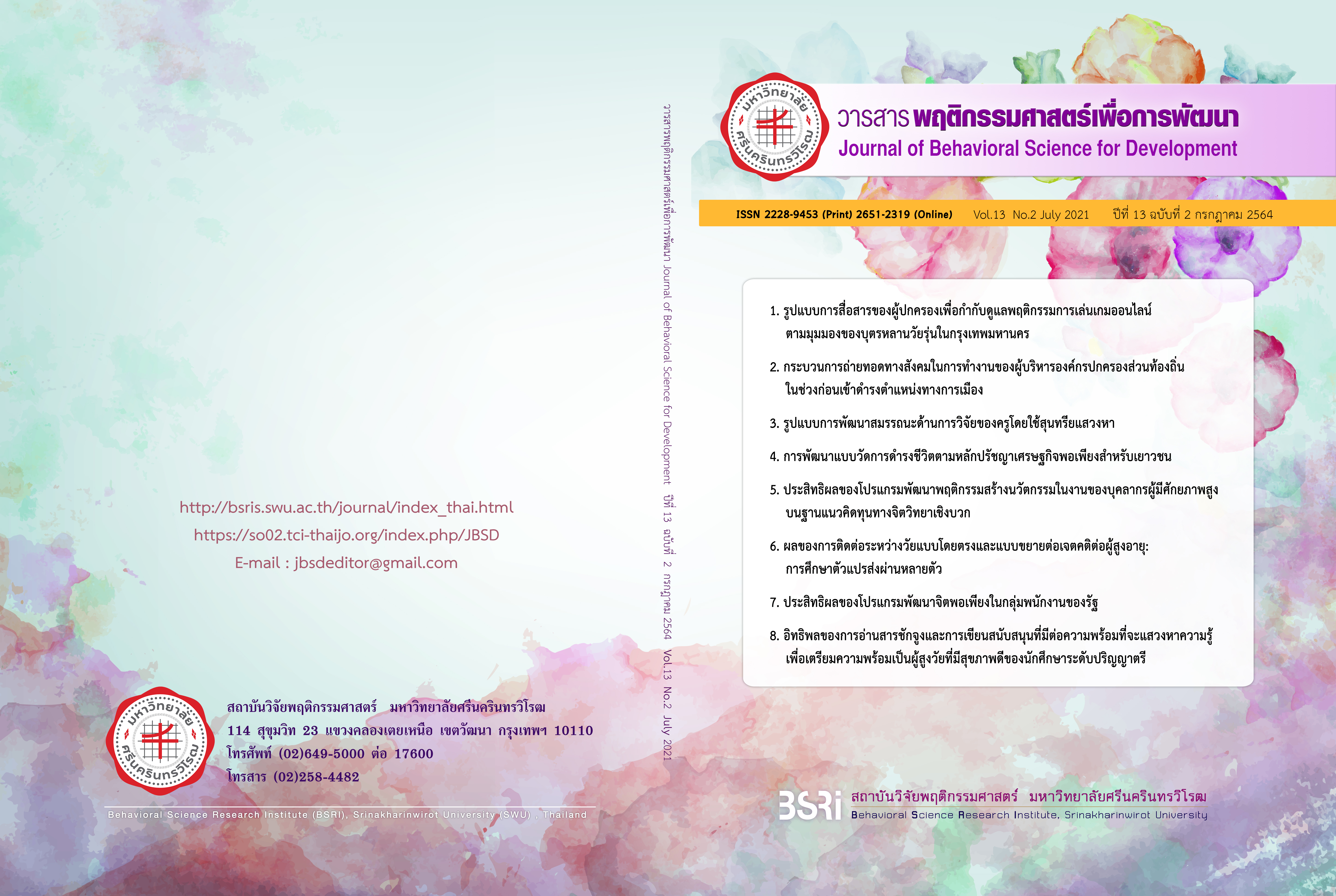Parental communication to monitor online gaming behavior in the views of teenaged children in Bangkok
Keywords:
parental communication styles, teenaged children, online gaming behavior, game addicted scores, game addicted levelAbstract
This research aims to study parents’ communication styles to monitor their children’s online gaming behavior, as well as to study the relations between the parental communication styles and teenagers’ online gaming behavior in Bangkok. The research design is mixed methods approach: qualitative and quantitative research design. The research has used focus group interviews and questionnaire distribution for data collection. The study has found that the most frequent used parental communication style is authoritative parenting, however teenaged children have mostly preferred and expected a permissive parenting style while authoritarian parenting style is their least preferred and expected. The 5 characteristics of children’s unfavorable parental communication are: 1) madly demanding them to stop the play abruptly 2) emotional scolding 3) nitpicking on their game playing 4) showing no confidence in them and 5) always blaming online games. The relationship between teens’ satisfactory level on parental communication styles to monitor their online gaming behavior and their online game addiction scores is negatively correlated and teenagers who are exposed to different parental communication styles, in their views, to monitor their online gaming behavior also show different frequencies in weekly online gaming. Suggestions for policy implications is that school, parents and medical organization should be together build a self-assessment mechanism for parents, and measure their effectiveness regularly and continuously
References
Baumrind, D. (1967). Child care practices anteceding three patterns of preschool behavior. Genetic Psychology Monographs, 75, 43-88.
Chantavanich, S. (2010). Kān wikhro̜ khō̜mūn chœ̄ng khunnaphāp [Qualitative data analysis]. Chulalongkorn University Press.
Charoenwanit, S. (2014). Phrưttikam kān tit kēm : Phonkrathop læ kān pō̜ngkan [Game addiction behavior: Effects and Prevention]. Thai Journal of Science and Technology, 22(6), 871-879.
Cheyjunya, P., Anawushsiriwongse, T., & Vivatananukul, M. (1998). Nǣokhit lak nithētsāt [The Core Concept of Communication]. Khāofāng.
Child and Adolescent Mental Health Rajanagarindra Institute. (2017). Khūmư̄ kānchai bǣp thotsō̜p kān tit kēm chabap dek læ wairun [The Manual of Game Addiction Screening Test]. Bangkok.
Creswell, J. W. (2013). Research Design: Qualitative, Quantitative, and Mixed Methods Approaches (2nd edition). Sage publications.
Department of Mental Health. (2019, December 11). Re: Phō̜ mǣ rangsan wichā chīwit kro̜ khum phai lūk [Parents create a life course, protective armor for children]. [Web article]. https://www.dmh.go.th/news-dmh/view.asp?id=28394
Department of Mental Health. (2019, February 12). Re: Yō̜t dek tit kēm phung hok thao [6 times the number of children addicted to the game]. (Web article). https://www.thaihealth.or.th/Content/40775
Electronic Transactions Development Agency. (2018). Rāingān phonlakā rasamrūat phrưttikam phūchai ʻinthœ̄net nai prathēt Thai pī sō̜ngphanhārō̜ihoksipʻet [The report of Thailand internet user profile 2018]. http://digital.library.tu.ac.th/tu_dc/frontend/Info/item/dc:145655
Intarathat, K., & Yenjabok, P. (2004). Kānsư̄sān rawāng bukkhon [Interpersonal Communication]. Pirun. https://pirun.ku.ac.th/~agrpct/lesson3/lesson3.html
National Statistical Office. (2018, October). Phonlakā rasamrawa čhō̜kā ramī kānchai theknōlōyī sārasonthēt læ kānsư̄sān nai khrūarư̄an Phō̜.Sō̜. sō̜ngphanhārō̜ihoksipʻet [Survey results on the use of information and communication technology in the household in 2019]. Thailand Ministry of Digital Economy and Society. http://www.nso.go.th/sites/2014/DocLib14/News/2561/10-61/N26-10-61.pdf
Pinto, N. (2020). Kānsư̄sān khō̜ng phūpokkhrō̜ng phư̄a kamkap dūlǣ phrưttikam kān len kēm ʻō̜nlai tām mummō̜ng khō̜ng but lān wairun kap phrưttikam kān len kēm ʻō̜nlai khō̜ng wairun nai Krung Thēp Mahā Nakhō̜n [Parental communication to monitor online gaming behavior in teenaged children’s view and their online gaming behavior in Bangkok] [Research Report]. Faculty of Journalism and Mass Communication, Thammasat University.
Rittakananon, P. (2006). Phatthanākān manut [Human Development]. Thammadā phlēt.
Schneider, L. A., King, D. L., & Delfabbro, P. H. (2017). Family factors in adolescent problematic Internet gaming: A systematic review. Journal of Behavioral Addiction, 6(3), 321–333. https://doi.org/10.1556/2006.6.2017.035
Tantipiwatanaskul, P. (2020, October 25). Phō̜mǣ ying khēmngūat lūk ying tō̜tān [The More Strict Parents, The more children resist] [Video]. Youtube. https://www.youtube.com/watch?v=XJQCxKtoG3Q
Thitimanakul, N. (2002). rīanrū rư̄ang kēm čhāk kēm mœ̄ tūa yong [Leaning Games from the Expert Gamer]. sœ̄mwit ʻinfō̜ mēchan.
Voice Online. (2017, February 11). Re: Phœ̄i pī hoksip phop dek - wairun pūai pen rōk tit kēm phœ̄m khưn hok thaotūa [Revealing the year 60 met children - teenagers Sickness with game addiction increased 6 times]. https://voicetv.co.th/read/r1voDNTIf
Wongrajit, K. (2018, November 1). Re: Nưng - čhet Phrưtsačhikāyon sapdā sukkhaphāp čhit hǣng chāt (November 1-7; The National Mental Health Week). https://www.dmh.go.th/sty_lib/news/articles/view.asp?id=1239
Yamane, T. (1967). Statistics; An Introductory Analysis. Harper and Row.
Downloads
Published
How to Cite
Issue
Section
License
Copyright (c) 2021 Journal of Behavioral Science for Development

This work is licensed under a Creative Commons Attribution-NonCommercial-NoDerivatives 4.0 International License.



